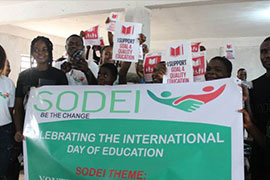Since late 2016, socio-political tensions have been rocking the North West and South West regions, the two English speaking regions of Cameroon. Unfortunately, these tensions have deteriorated and escalated to a crisis which has resulted in the loss of lives, heightened insecurity, thousands of refugees in neighboring Nigeria and thousands more internally displaced, loss of livelihoods and violence among other vicious consequences. According to latest United Nations estimates, 1,800 people have been killed and over 500,000 displaced since 2017. The humanitarian situation in these regions has also deteriorated fast leaving children more exposed and ultimately the most affected in all the group of victims. The focus of the available humanitarian response is hardly education even though most victims are women and children. Concerns for children in these troubled regions include security, physical and mental well-being and access to education.
Education has a vital role to play in the adoption of strategies that reduce risks of conflict and create a culture of peace and resilience. Every child has the right to education but that is more than can be said for every child in Cameroon’s English-speaking regions. For the last three years, students in the English – speaking regions have hardly had a full uninterrupted school year. From an imposed ghost town every Monday to spontaneous shutdowns which have sometimes lasted 10 days, an already prejudiced system of education can hardly thrive. Education in these regions has suffered a terrible blow with the shutdown or even burning of schools, the targeting of schools by armed persons, kidnapping of students and speculations of the cancellation of the academic year due to the time lost. UNICEF has recently estimated that up to 80% of schools in the southwest and northwest regions have been closed affecting more than 600,000 children. The situation is even more precarious for those children whose parents have lost their livelihoods and or are in a situation of involuntary displacement, causing serious financial constraints and thereby putting a ceiling over the rights of many children to education.
Even before the crisis began, the problem of the children in these regions as regards education was compounded by exclusion probably as a result of limited means and or a false perception that formal education is not imperative for success. This problem has been exacerbated by the witnessing of traumatic events like the destruction of homes and schools as well as further exposure to undesirable situations such as homelessness, poverty, sexual exploitation, abuse and trafficking. The girl child is on the receiving end of the worse of these effects.
All of this points to the fact that, society has failed children and young people and it is our collective responsibility to correct this.
The role of SODEI in securing the right to education for children in the troubled regions.
SODEI was born out of the need to contribute to a society where children and young people have equal access to education and participate in building a society where they can grow up happy, healthy and confident of a bright future. SODEI is committed to putting children’s rights and well-being and their equal access to education at the core of all their work. To do this SODEI aims to promote the rights and well-being of children and young people in Cameroon through education and participation. Through a mentoring programme, SODEI is empowering children and young people with supplementary education to facilitate the acquisition of skills. Putting children and young people’s rights and well-being at the forefront of policy in partnership with other civil society organizations and government resources has been a primary focus. Educating young people on Sustainable Development Goals concerning youth and education and how they as beneficiaries can be involved, help to make these goals a reality in their communities.
Most importantly, giving a voice to children and young people through the creation of community resource centers in various cities in Cameroon, like the one in currently operated by SODEI in Limbe which has after-school, computer literacy and mentorship programmes. One other very important focus of the work of SODEI is changing the way society views and treats young people especially women and girls through empowerment programs which educate on taboo subjects like menstrual hygiene and designing programmes aimed at especially empowering the young girl in her ability to make responsible choices and be a more active member of her society.
What still needs to be done: Moving forward
All Cameroonians are equal by virtue of the constitution and thus the right of every child to a sound education should be respected. No one should be left behind. It is alarming to think that a child in a village somewhere has just spent three years without going to school when they have the right to education. That is a sure way to jeopardize their future. As a new academic year approaches, parents and children in the North West and South West regions are still uncertain of what will be. Children need an enabling environment to profit fully from their right to education. This signifies access, safety and equality for all. It is incontestable that when children and youth develop literacy skills, they improve not only their own economic and prospects and personal development, but also that of their families, communities, and countries.
According to Allegra Baiocchi, the United Nations Resident Coordinator and Humanitarian Coordinator for Cameroon, in a recent interview with the ‘Education Cannot Wait Fund’, it is the responsibility of the humanitarian community and by extension the civil society to protect children’s right to education and to get these kids back on track with their learning”.






